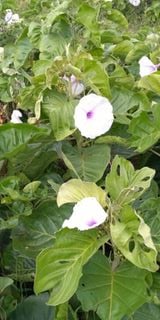Ipomea plant: The allure of death in Kajiado grazing fields

Flowering Ipomea plant in Ibisil, Kajiado County.
What you need to know:
- The plant has a heavy seeding ability, heavy foliage, and a well-developed root system.
- Ipomoea belongs to the sweet potato family, Convolvulaceae,but few details have been documented.
The Ipomea plant has taken the toll on the fodder, to the chagrin of the optimistic herders.
As adverse climate change effects continue to spread to the pastoral community in Kajiado County, the Ipomea plant has been identified as a significant catalyst for affecting the locals' food security.
The green leafy plant known as Ipomoea hildebrandtii scientifically is locally referred to Olbeneyio/oltiameleteti/oltiameleshiin Maa language and is said to have spread to at least 3 million acres of grazing land in Kajiado County. This has endangered the herders' source of livelihood and food security.
Kajiado West, South, Central, East and North bear the major brunt of the plant. The plant has a heavy seeding ability, heavy foliage, and a well-developed root system, enabling it to aggressively spread, smothering any natural pasture in its proximity.
Ipomoea belongs to the sweet potato family, Convolvulaceae,but few details have been documented. When in bloom, it often has beautiful purple flowers. This species is reportedly a recent rangeland pasture coloniser weed in Kajiado County and is highly responsive to a marginal rainfall regime. It can grow to more than 2 metres and spread up to 4 meters in diameter.
During the 2020-2022 drought, herders in the semi-arid vast county lost hundreds of animals, and at least 350 families faced starvation, according to National Drought Management Authority (NDMA) data. Herders are yet to fully re-stock the animals.
With the recent months of heavy rains, the much-needed fodder has flourished, but the herders' joy might be short-lived. The Ipomea plant has taken the toll on the fodder, to the chagrin of the optimistic herders.
Mr Stephen Nkabash, 59, from Kajiado Central Sub County, told the Nation that the Ipomea plant has become the biggest threat to pastoralists, escalating the effects of climate change.
"The plant is spreading alarmingly diminishing fodder that is non-palatable to livestock. Kajiado has been experiencing an annual drought, killing livestock in masses. The dangerous plant is escalating the effects of climate change. Soon, the range lands will be no more, "Said Nkabash, adding, "Most herders have been trying to control the plant by uprooting with minimal success."
Also, bee-keeping enterprises in the vast county are on the verge of collapsing as bee farmers stare at poisonous honey production occasioned by dangerous Ipomea plant nectar.
Currently, honey produced from Kajiado County is considered poisonous. Traders no longer buy it, crushing a once lucrative venture and herders' diversification from cattle rearing.
"My family members used to consume the honey collected from family beehives until we realised it was making us sleepy and suffering from fatigue," said Nancy Marikua, Kajiado central sub-county resident.
Farmers say they used to fetch Sh 500 for a kilogram of raw honey, but the price kept shrinking to Sh 100 per Kilogram. Honey brokers no longer traverse the villages for the honey like before.
"BBeekeepingin this region is untenable. Wild honey is also too dangerous after locals discovered the honey makes consumers doze. I used to keep more than 50 beehives in my ranch but can't do it anymore," said Timothy Kores, a local bee farmer.
Deputy Director in the State Department for Livestock Development Halima Nenkari said the plant of Greek origin,first discovered in Kajiado after the El-Nino rains of 1997-98, is an aggressive natural pasture competitor and kills any pasture around it.
"The colonisation of large pasture areas by the weed is adversely affecting pasture adequacy for livestock in Kajiado. This leads to reduced agricultural activities in range lands, heavy deforestation, and charcoal burning for locals to earn a living," said Ms Nenkari.
The agriculture and Climate expert, who initially worked with the Agricultural sector development support program (ASDSP) as Kajiado county coordinator, said the little-documented Ipomea plant requires a holistic approach in the wake of adverse climate effects, especially in ASAL regions.
"Uprooting and burning the plant remains the only option for now. A local university has recently launched research on the dangerous plant," she added.





